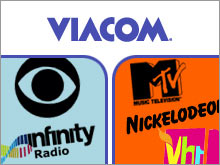Viacom's Web guru plans for the future

By Greg Sandoval
If Viacom continues to engage in a corporate shoving match with Google's YouTube, Mika Salmi may well be the entertainment conglomerate's secret weapon.
Salmi is a hybrid of sorts--a hipster businessman who helped discover the rock band Nine Inch Nails, and a technology whiz who's now president of Global Digital Media for Viacom's MTV Networks. He is also the founder of Atom Entertainment, the Internet video and game pioneer acquired by MTV last August for $200 million.
At MTV Networks, made up of such properties as MTV Music Television, Nickelodeon and Comedy Central, Salmi is the person who determines where Steven Colbert, SpongeBob SquarePants and South Park's Cartman appear on the Web. With Viacom embroiled in a $1 billion legal fight with YouTube, Salmi could play a key role behind the scenes, planning Viacom's tech strategy as it tries to embrace the Internet while avoiding the embrace of the site it claims in its suit is responsible for literally hundreds of thousands of copyright violations.
In an interview with CNET News.com at Viacom's Manhattan offices, Salmi said he had little to do with the negotiations with YouTube and that he hoped a licensing deal could be worked out. If it can't, he said he's confident MTV Networks and Viacom will be just fine.
Salmi believes big "portal sites" such as YouTube and MySpace.com will give way to niche sites that appeal to audiences with special interests. This, said Salmi, is a game MTV Networks knows how to play. The company has been pinpointing niches in music and entertainment for decades, and MTV Networks has more than 150 Web sites and 136 TV channels around the world, he said.

"When I started here, I said we should go deeper and make all these TV shows and all these brands into their own communities and worlds," Salmi said. "If the audience likes (The Colbert Report), they want to get to Colbert as quickly as possible. They don't want to necessarily go through Comedy Central...The thought is that we should go from having dozens of brands to hundreds of brands."
Salmi, 41, worked at the record label EMI Group before founding Atom in 1995. Atom consisted of game sites Shockwave and AddictingGames.com, and video sites Addictingclips.com and AtomFilms, a site specializing in short films.
"He really helped develop a new category, which was short clips online," said Todd Chanko, an analyst with Jupiter Research. Salmi stuck it out with video when almost everybody else threw in the towel because of poor picture quality and slow download speeds, said Josh Felser, the CEO of the video-sharing site Grouper.
"Mika is very well respected in online video because he kept his vision intact," said Felser, who sold Grouper to Sony last year. "He survived all the trouble during the dot-com collapse and ended up selling his company for a bucket load of money."
Salmi said that after Viacom bought Atom, members of MTV Network's brass asked him what he would do if he were running the company. Salmi didn't hesitate to speak his mind.
"I had the answer instantaneously," recalled Salmi, as he gazed out his 28-floor office, with its view of New Jersey and the Hudson River. "I said 'This is what we're going to do.' I think they were surprised that I had it so quickly."
The knock against Viacom, of course, is that it's too old-media to understand the Web. "Think about all the ways that they could have monetized the tremendous youth-brand equity and youth audience they collected," Chanko said. "All of their people are using instant messaging. They didn't have the technology to develop it on their own, but why didn't they think about branding a third-party system?"
Trying to buck that perception, Salmi has championed several tech projects at the media giant. He sponsored the idea of offering the so-called embed code that allows fans of popular programs to post clips to their MySpace pages or blogs. The concept is similar to YouTube's own tools for embedding videos on other sites.
Salmi is also attempting to merge content across TV and Web platforms. Web shows are new on-air series that feature programming clips from Comedycentral.com and AtomFilms.
One of the tasks that Salmi is determined to tackle is how to exploit technology developed in varying areas of the vast Viacom empire. In the United Kingdom, for example, MTV Networks has Flux, a 24-hour user-generated television channel. Users go to a Web site and post clips and then the content appears on TV. In Japan, MTV Networks has an offering that lets people move their mobile content to TV.
Salmi said the Web isn't going to replace Viacom's TV revenues anytime soon. "I personally believe a big part of my job is helping television," he said. "It shouldn't be where the digital people are here and the TV people throw some content over a wall and the digital people throw some back. Someone with a creative vision behind a TV show or an online game should drive that vision through all platforms."
Asked for a hint on how the YouTube conflict might end, Salmi wouldn't say. He noted, however, that he's friendly with YouTube founders Steve Chen and Chad Hurley and still hopes for a resolution.
"There was never any strategy at Viacom that said, 'We don't want people to watch our videos (at YouTube),'" Salmi said. "We want to be a distributor. We have distribution deals with iTunes and Comcast and recently we did a deal with (online video company) Joost. We didn't want to do it all ourselves. But if someone is actually making money on our content we tell them that, 'If you want to distribute our content we should have a deal with you.' If it's a professional relationship, then there should be a business deal.
"We just couldn't come to an agreement with YouTube," he added. "But we certainly want to be there."